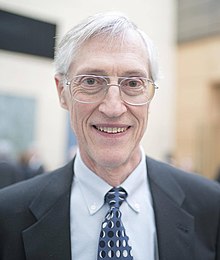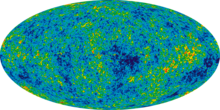John C. Mather
John Cromwell Mather | |
|---|---|
 Mather in 2015 | |
| Born | August 7, 1946 Roanoke, Virginia, U.S. |
| Alma mater | Swarthmore College University of California, Berkeley |
| Known for | Cosmic microwave background radiation studies |
| Awards | Dannie Heineman Prize for Astrophysics (1993) Nobel Prize in Physics (2006) |
| Scientific career | |
| Fields | Astrophysics, cosmology |
| Institutions | NASA University of Maryland Columbia University |
| Thesis | Far Infrared Spectrometry of the Cosmic Background Radiation (1974) |
| Doctoral advisor | Paul L. Richards |
| Signature | |
 | |
John Cromwell Mather (born August 7, 1946) is an American astrophysicist, cosmologist and Nobel Prize in Physics laureate for his work on the Cosmic Background Explorer Satellite (COBE) with George Smoot.
This work helped cement the big-bang theory of the universe. According to the Nobel Prize committee, "the COBE-project can also be regarded as the starting point for cosmology as a precision science."[1]
Mather is a senior astrophysicist at the NASA Goddard Space Flight Center (GSFC) in Maryland and adjunct professor of physics at the University of Maryland College of Computer, Mathematical, and Natural Sciences. In 2007, Time magazine listed Mather among the 100 Most Influential People in The World. In October 2012, he was listed again by Time magazine in a special issue on New Space Discoveries as one of the 25 most influential people in space.
Mather is one of the 20 American recipients of the Nobel Prize in Physics to sign a letter addressed to President George W. Bush in May 2008, urging him to "reverse the damage done to basic science research in the Fiscal Year 2008 Omnibus Appropriations Bill" by requesting additional emergency funding for the Department of Energy's Office of Science, the National Science Foundation, and the National Institute of Standards and Technology.[2]
Mather served as the senior project scientist for the James Webb Space Telescope (JWST) from 1995 until 2023, when he was succeeded by Jane Rigby.[3]
In 2014, Mather delivered an address on the James Webb Space Telescope at the second Starmus Festival in the Canary Islands.
Education and initial research
[edit]| Part of a series on |
| Physical cosmology |
|---|
 |
Honors and awards
[edit]- 1964–1968 Swarthmore College Open Scholarship (honorary)
- 1967 William Lowell Putnam Mathematical Competition, 30th place nationwide
- 1968 Highest possible score (990), physics Grad Records
- 1968–1970 NSF Fellowship and honorary Woodrow Wilson Fellowship
- 1970–1974 Fellow, Hertz Foundation
- 1974–1976 Postdoctoral Fellow, NRC
- 1990 NASA GSFC John C. Lindsay Memorial Award
- 1991 Rotary National Space Achievement Award
- 1991 National Air and Space Museum Trophy
- 1992 Aviation Week and Space Technology Laurels for Space/Missiles
- 1993 Discover Magazine Technology Award finalist
- 1993 American Institute of Aeronautics and Astronautics Space Science Award
- 1993 American Astronomical Society and American Institute of Physics Dannie Heineman Prize for Astrophysics
- 1994 Fellow, Goddard Space Flight Center
- 1994 Doctor of Science, honoris causa, Swarthmore College
- 1995 City of Philadelphia John Scott Award
- 1996 American Academy of Arts and Sciences Rumford Prize
- 1996 Fellow, American Physical Society
- 1997 Aviation Week and Space Technology Hall of Fame
- 1997 Member, National Academy of Sciences
- 1998 Marc Aaronson Memorial Prize
- 1998 Member, American Academy of Arts and Sciences
- 1999 Franklin Institute Benjamin Franklin Medal in Physics
- 2005 Society of Photo-Optical Instrumentation Engineers George W. Goddard Award
- 2006 Peter and Patricia Gruber Foundation Prize in Cosmology
- 2006 Nobel Prize in Physics
- 2007 Fellow, SPIE - The International Society for Optical Engineering
- 2007 American Academy of Achievement, Golden Plate Award [5]
- 2008 Robinson Prize[6]
- 2008 Doctor of Science, honoris causa, University of Maryland
- 2008, Commencement Speaker, University of Maryland Winter Commencement
- 2010 India General President Gold Medal[7]
- 2010 Fellow of the Optical Society of America
- 2011 Doctor of Science, honoris causa, University of Notre Dame[8]
- 2020 Elected a Legacy Fellow of the American Astronomical Society.[9]
- 2023 Joseph Priestly Award, Dickinson College
Publications
[edit]- Mather, J. C. "Far Infrared Spectrometry of the Cosmic Background Radiation", University of California Berkeley, Lawrence Berkeley National Laboratory, United States Department of Energy (through predecessor agency the Atomic Energy Commission), (Jan. 1974).
- Mather, J. C.; Albrecht, A.; et al. "Report of the Dark Energy Task Force", Fermi National Accelerator Laboratory, United States Department of Energy, (2006).
- Mather, J. C.;Boslough, John; the very first light; 1996,2008 Basic Books
Appearances
[edit]Mather is the Science Director of the National Academy of Future Scientists and Technologists.
References
[edit]- ^ "The Nobel Prize in Physics 2006" (Press release). The Royal Swedish Academy of Sciences. 3 October 2006. Retrieved 2006-10-05.
- ^ "A Letter from America's Physics Nobel Laureates" (PDF).
- ^ Gutro, Rob (Jun 28, 2023). Adkins, Jamie (ed.). "NASA Names Dr. Jane Rigby New Webb Telescope Senior Project Scientist". NASA. Retrieved June 28, 2023.
- ^ John C. Mather on Nobelprize.org , accessed 30 April 2020 "When I finished 8th grade, it was time to go to high school, and my parents decided to send me to Newton High School, where they thought we would get the best available education in our area."
- ^ "Golden Plate Awardees of the American Academy of Achievement". www.achievement.org. American Academy of Achievement.
- ^ "NASA - Goddard Space Science is the Place for Awards This Season". Archived from the original on 2016-03-04. Retrieved 2010-02-02.
- ^ "PM gives away awards to prominent scientists". PIB. Government of India. 3 January 2010. Archived from the original on 21 July 2011.
- ^ University of Notre Dame. "Honorary Degrees". Archived from the original on 13 August 2011. Retrieved 20 June 2011.
- ^ "AAS Fellows". AAS. Retrieved 29 September 2020.
External links
[edit]This article's use of external links may not follow Wikipedia's policies or guidelines. (May 2023) |
 Media related to John C. Mather at Wikimedia Commons
Media related to John C. Mather at Wikimedia Commons
- John C. Mather biography at the Goddard Space Flight Center
- Interview with John Mather from the SPIE Newsroom
- Berkeley lab article
- Mather's group's data that led to the Nobel Prize in symmetry magazine.
- John C. Mather on the Infancy of the Universe at the National Academy of Sciences
- John Mather Nobel Scholar Program
- AIP Mather Policy Internship Program
- John Mather Nobel Medal replica flown in Space Shuttle Atlantis
- Replica of John Mather Nobel Medal in National Air and Space Museum permanent collection
- John Mather commencement address at Swarthmore College from 2007 on YouTube
- John Mather Nobel banquet speech from 2006
- John Mather commencement address at the University of Maryland from 2008
- John Mather visits German Embassy[permanent dead link]
- John Mather in White House
- John Mather Nobel Scholarship has new host
- University of Maryland names John Mather College Park Professor
- Daniel Chalonge Medal 2011 awarded to John Mather
- National Geographic showcases John Mather
- John Mather elected Fellow of AAAS
- John Mather's 2021 Talk in the Silicon Valley Astronomy Lecture Series on 'How the Smooth Early Universe Grew into Everyone You Know'
- American Astronomical Society hosts John Mather inspiring students[permanent dead link]
- John Mather on Cosmic Complexity
- John Mather 2012 delegate at the Blouin Creative Leadership Summit
- John Mather in dialogue at Lindau Nobel
- John Mather on Golden Age of Astronomy (video) on YouTube
- Smithsonian presents John Mather
- John Mather receives the Power of Excellence Award "for his excellence in his career and becoming a positive role model."
- Southern Illinois University Shaw Lecture features John Mather
- 2013 Albert Einstein World Award of Science Nomination
- John Mather delivers 2014 UC Berkeley Regents Lecture (video) on YouTube
- John Mather Biography and Interview on American Academy of Achievement
- John C. Mather on Nobelprize.org including the Nobel Lecture on 8 December 2006 From the Big Bang to the Nobel Prize and Beyond
- 1946 births
- Living people
- American astronomers
- American Nobel laureates
- 21st-century American physicists
- Fellows of the American Physical Society
- Goddard Space Flight Center
- NASA people
- NASA astrophysicists
- Nobel laureates in Physics
- People from Sussex County, New Jersey
- People from Roanoke, Virginia
- Swarthmore College alumni
- University of California, Berkeley alumni
- University of Maryland, College Park faculty
- Columbia University faculty
- Fellows of Optica (society)
- Honorary members of Optica (society)
- Members of the United States National Academy of Sciences
- Winners of the Dannie Heineman Prize for Astrophysics
- Scientists from Virginia
- Fellows of the American Astronomical Society
- Benjamin Franklin Medal (Franklin Institute) laureates

